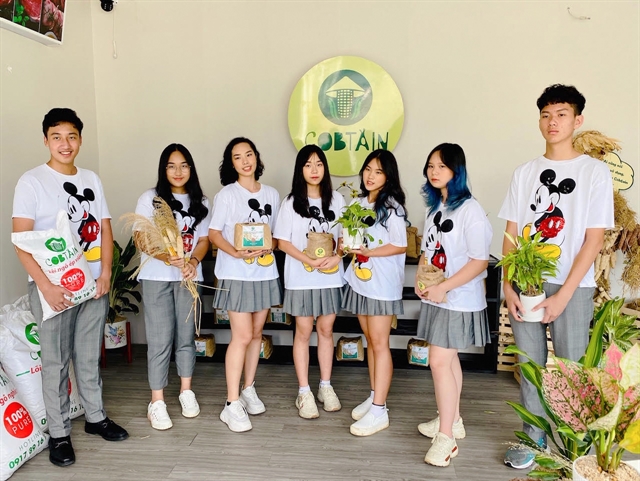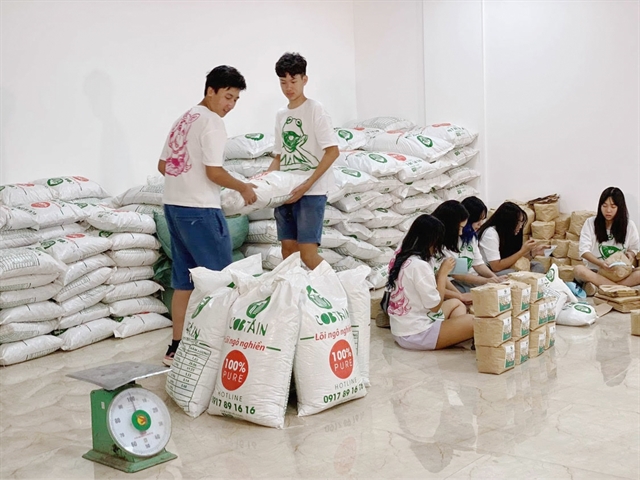 Society
Society


|
| Cobtain’s co-founders at the company’s showroom on Hoàng Quốc Việt Street in Hà Nội. — Photo courtesy of Cobtain |
Mai Hiên
HÀ NỘI — Seven Vietnamese students aged from 13-16 have turned leftovers from corn farming into useful products for the community.
They have started their own business which recycles corncob waste into meals for cattle, pellet biofuel and animal bedding products.
“The idea of recycling corncob came to us naturally. It was our summer trip to Mai Châu (Hòa Bình Province) when we saw many corncobs being thrown alongside the road and burnt, leading to a foul smell. We thought those actions were extremely harmful to the environment and decided to turn the agricultural residue into useful products,” said Nguyễn Phúc Thạch Anh, a co-founder of Cobtain Ltd.
“We study in different schools, namely British Vietnamese International School Hanoi (BVIS), British International School Hanoi (BIS), Concordia, and Archimedes, also are in charge of different positions in the company, but one thing that we have in common is the desire to make Earth a greener place and to improve people’s living standards,” Nguyễn Ngọc Khánh Linh, another co-founder, said.
It took them almost a year to go on field trips, research, devise a business strategy and introduce products to the market.
The products are of natural origin, cheap and environmentally-friendly.
According to Nguyễn Vĩnh Hạnh Linh, a co-founder, the biggest difference between Cobtain’s products and others of the same type in the market are their humidity.
“We dry out the corncobs so their humidity is below 12 per cent, protecting them from fungus and bacteria,” she said.
She also said they replaced usual plastic bags with jute bags to make their products 100 per cent eco-friendly.
Challenges
As a new company, Cobtain has faced a lot of obstacles.
“Since all of the members are really young, and still full-time students, besides developing this project, we have to spend a lot of time studying at school and doing homework, which requires good time management skills,” said Phạm Minh Tuấn, a co-founder.
“We also encountered financial difficulties at first. But fortunately, we found a generous supplier who is willing to help us to manufacture the products for a reasonable price and later became our strategic partner so our savings turned out to be enough to operate the company.”
Trần Thái Uyên, another co-founder, said Cobtain members deliver the orders on their own because they can't afford delivery services.
“It’s quite tough to be honest, especially in the boiling hot summer days. But it’s also a valuable experience that we do kind of manual work and have a real connection with our products.
“We still remember that on one of the hottest days in July, the whole team made the delivery to the Fruit and Vegetables Research Institute in Gia Lâm District since it was a huge order. Although we did it at noon, when it was about 40 degrees, we still enjoyed it and had so much fun in the beautiful gardens there,” she said.
Tuấn said the biggest obstacle at the moment was how to balance running the business and studying.
“We have spent all summer on this project, but it’s a new school year now and of course, our parents want us to put studying first. So now we have to reduce the workload at some points,” he said.
For example, they can't do the deliveries by themselves anymore, so they have encouraged customers to collect their orders in their store or hire delivery services.
“The most precious lessons for us after investing in Cobtain are how to run a business. Before Cobtain, we had no idea what business is and how a company operates. But after learning from our teachers, mentors, and also parents, we can now run the company on our own.”
Talking about the value that Cobtain brought about to the community, Trần Hải Yến, a co-founder, said it was in line with the company’s mission.
“Firstly, we have raised the annual income of a number of poor peasants living in the northern mountainous area by 10 per cent. And in terms of protecting the environment, our business model can lend a helping hand in preventing CO2 from being emitted to the atmosphere and solving the 10 million tonnes of corncob wasted every year in Việt Nam,” he said.
With their initiative to recycle corncobs into crop products and animal feed, the Cobtain team won the first prize at the 2020 Students for the Advancement of Global Entrepreneurship (SAGE) World Cup.
They also won the two categories of Zero Hunger and Climate Action in the special competition of the UN’s Sustainable Development Goals (SDGs) at the competition, Anh said.
The SAGE World Cup is a contest for students aged 13 to 18, to search for future entrepreneurs. It is held annually at the national and global level. Students with an interest in innovation present business ideas to a judging panel consisting of outstanding figures in business, community work and education.
Nadja Bester, a SAGE coach, who was in charge of delivering lessons to Cobtain, said she was impressed by the team’s dedication, saying they created a profitable enterprise and built environmental efforts and social concerns into the DNA of their company.
“The world needs young leaders who will lead the next generation into a more sustainable future, building a world where people, planet, and profit can all coexist in a way that benefits everyone, not just a small, privileged minority,” she said.
Nadja hoped that Cobtain would serve as an example for other young Vietnamese people.

|
| Nguyễn Phúc Thạch Anh and Phạm Minh Tuấn (first and second left) and other Cobtain co-founders work at the company warehouse. — VNS Photo Quỳnh Trang |
According to Dương Phương Nhi, a co-founder of Cobtain, their target customers at first were office workers and businessmen who love gardening.
“By conducting market research, we found these groups of customers were more likely to use our products regularly, and their average purchase could be high.”
However, she said, when the products were launched, they appealed to other groups of customers as well.
“Since our products can be used as pet litter or for pet bedding, many pet owners in Hà Nội have placed orders. Moreover, we also have plenty of regular customers who own flower or cattle farms. Luckily, the customer’s feedback has been pretty good so far.
“They are into our products and also recommend us to their friends, and we truly appreciate that,” Nhi said, adding that about 34 tonnes of products have been sold in just two months.
Having bought two tonnes of corncob, Hà Nội resident Phan Thị Hồng Hà, 35, said maintaining moisture, a reasonable price and being environmentally-friendly are what she likes most about the product.
“I used to put rice husk for plants in my garden but I found it affected the plants’ roots due to its roughness.”
After using the corncob product for a month, Hà discovered it was better than rice husk as the product help soften the soil and maintains moisture while preventing grass from growing around the roots.
“Instead of burning corncob, the students have turned it into a product that provides many minerals and nutrients to the roots almost as organic fertiliser,” she said, adding that the price of VNĐ7,000 (3 US cents) per kilo was reasonable.
Lê Thị Thu Hằng, director of Thiên Đường Hoa Trade and Service JSC, which specialises in providing rose varieties and bonsai care, agreed.
“Through a recommendation from my friends, I decided to use Cobtain’s corncob on my farm, and the results were very good,” she said.
Besides softening the soil, the product helps limit evaporation of plants and restricts fungal diseases, Hằng said.
For Cobtain’s members, winning first prize at the SAGE competition meant a lot to them and would serve as motivation to work harder in the future.
“For the five years ahead, we plan to expand our market nationwide and worldwide. We want to export our products to Japan or South Korea, where the demands are high," Thạch Anh said.
“We plan to invest in mushroom farms to not only increase farmers’ income but also diversify our range of products,” he said. — VNS




